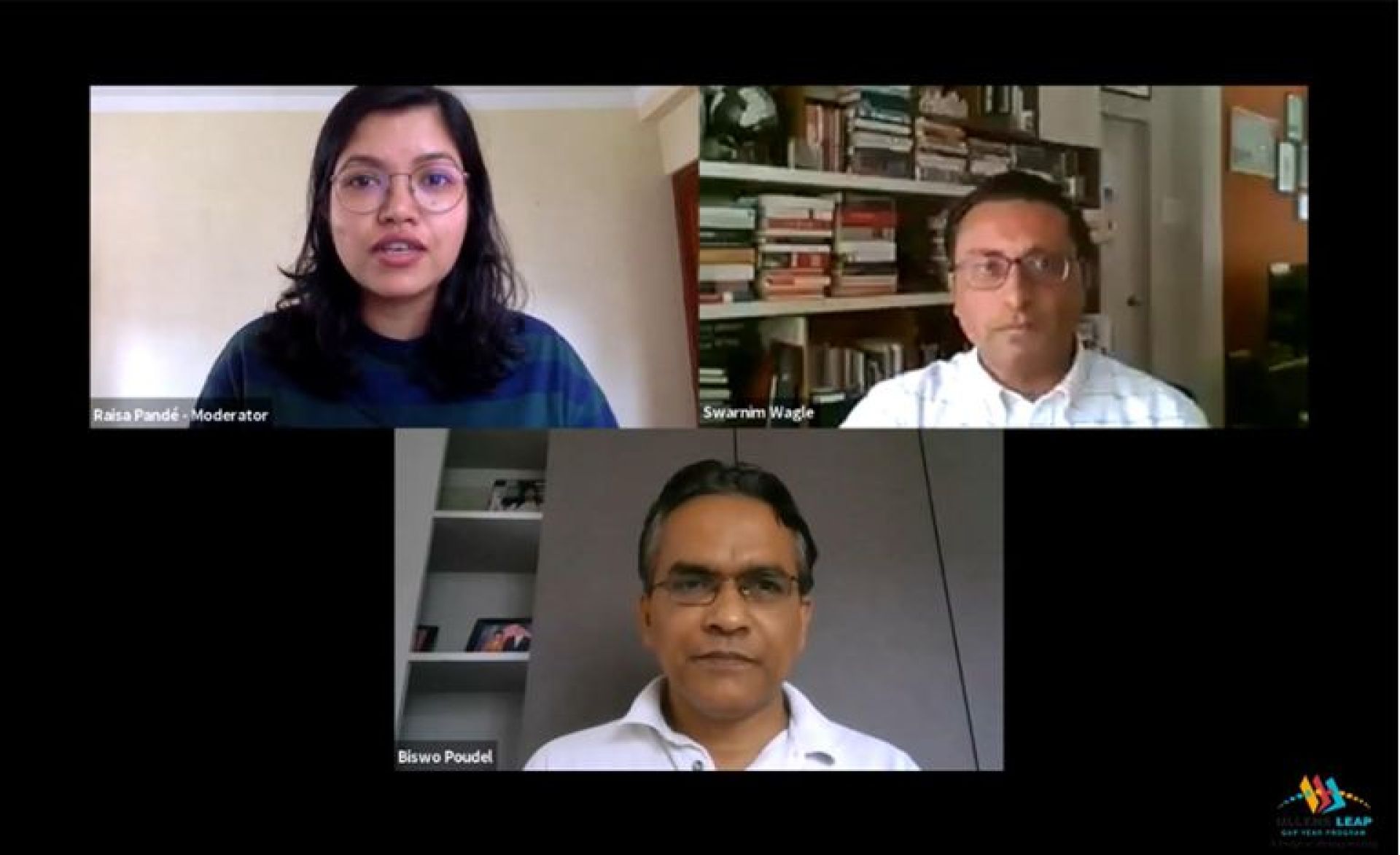
Advice from the experts – UEF in conversation with Dr. Swarnim Wagle and Dr. Biswo Poudel – Adapting Education to New Challenges and Uncertainties
ULLENS Leap
“Unprecedented” – that is how Dr. Wagle and Dr. Poudel describe the impact of Covid on the education sector. Not just in terms of disruptions in the education sector, but also the mental scarring left by Covid on the impressionable minds of young children. However, they are both hopeful there will be enough policy interventions and innovation to bring a level of normalcy to the sector within a year or year and a half. Their optimism comes with stark warning, that if we were to lose more time to bring normalcy to the sector, we might see an entire generation suffer from lost opportunities. Dr. Wagle recollected the age of some of his acquaintances from China who said they went to graduate school in their 50s because their college years were lost as a result of the Cultural Revolution.
On a big picture, we need to cherish and celebrate the accomplishments and progress Nepal has made in widening access to basic education. Investment in the education sector has been massive. Nevertheless, results have been elusive because there are some missing pieces. Critically measuring learning outcomes and proper alignment of incentives of teachers with those learning outcomes are some of the major gaps. Dr. Wagle mentioned it is important to learn from new ideas, such as those floated by Nobel laureates, Dr. Abhijeet Baneerji and Dr. Esther Duflo, on innovative ways to improve learning outcomes and school performance. Dr. Poudel believes the families of the future will be globetrotting, living across continents with different passports. Thus it is important to teach students early on about their roots and heritage. More importantly to teach them to be compassionate, to take what is best in their heritage and to become responsible global citizens.
Both echoed the importance of innovation in how education is delivered. While Covid has forced an accelerated adoption of digital medium to teach, innovation doesn’t stop there. Innovation in how institutions are structured are equally important. Instead of school systems being either community-owned or privately-owned, there has to be greater variety in operational models. Dr. Wagle gave example of his alma matter, Budhanilkantha School, which is run as a trust (Guthi), and Ullens School that is run as a not-for profit institution. When parents are called to volunteer to improve the schools, there is a direct alignment of interest with the school management. However, currently such schools are not accessible to the majority. Thus, it is important to figure out how to replicate the models in a cost effective manner. Public-private models of cooperation that has delivered in the health sector could be applied here too.
Exploring new actors in the field of education such as Teach for Nepal, or engaging the industry might help bridge the void in the current system. There is a need to train people in new technologies. Some factories in Eastern Nepal have already moved away from labor intensive technology to capital intensive technology, changing the skill set that is required. While four lakh people go abroad for foreign employment each year, 75% of them are unskilled according to Dr. Wagle. Thus, the economist duo emphasized the need to clearly connect quality education and skills to access to good jobs for prosperity. “We need to improve the marginal productivity of labor”, emphasized Dr. Poudel. They see education as a means to build future-proof skills to adapt with the changing world. Skills that foster creativity, collaboration, digital facility, logical thinking, time management are transferrable across time and across industries. Skills needed for routine jobs are different from those requiring cognitive abilities, complex problem solving, empathy and sociability.
However, the purpose of education does not end in skills or a job only. Both reiterate education should develop humility in children, “non-arrogance” as Dr. Poudel puts it, the culture of helping and giving back to society. Dr. Wagle hopes his son is aware of his unique roots, builds a character grounded in the values associated with his roots, and would grow to be professionally “agnostic.” Whichever career is chosen, the emphasis is to seek fulfilment and to excel in it. He recalled his youth where the only expectation from family and society was to either become a doctor or an engineer. For that, we need good teachers that give moral guidance and support to students, attributes that are hard to be replaced by technology.
Conversation conducted by Ullens School IB coordinator: Raisa Pande on behalf of Ullens Education Foundation
Dr. Poudel is currently a Visiting Associate Professor at Kathmandu University, columnist in Kantipur Daily, a member of the board of directors of Sanima Middle Tamor Hydropower Company, and a member of the board of trustees of Ullens Education Foundation. He had previously served as the economic advisor at the National Planning Commission (NPC) and the International Labour Organization (ILO). His areas of expertise are natural resources economics and labour economics.
Dr. Swarnim Waglé is Chairman of the Institute for Integrated Development Studies (IIDS). Between 2014 and 2018, he served the National Planning Commission (NPC) as Member and then as Vice-Chair (with rank equivalent to minister) for three years. He has worked as an international development professional for more than 15 years on policy assignments in over 20 countries, including as Senior Economist at The World Bank in Washington, DC. Dr. Waglé chairs and advises several non-profit organizations. He is a Senator of Kathmandu University; member of the World Bank’s South Asia Championing and Visioning Process; and a member of the South Asia Governing Council of Future Earth. He holds academic degrees from ANU, Harvard and LSE.